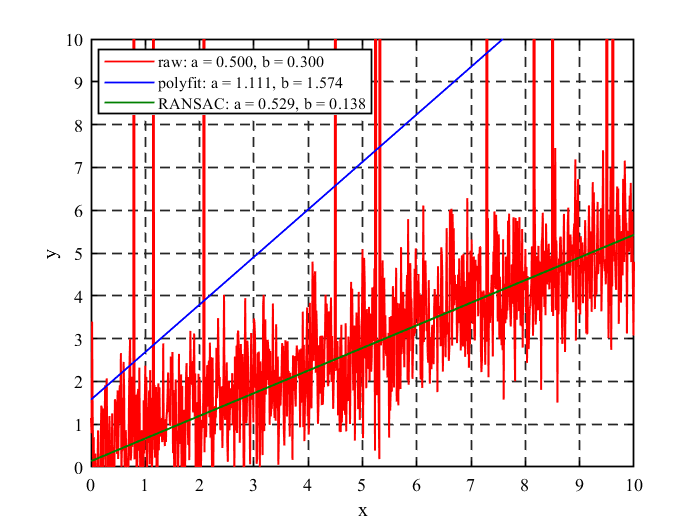単純なRANSACをMATLABで試す
原理のお勉強用に,MATLABでとても単純なRANSACアルゴリズムを作ってみました.
下記のPythonを参考にさせて頂き,作ってみました.
qiita.com
clear; close all; % true values a = 0.5; b = 0.3; % samples x = 0:0.01:10; points = a * x + b + 1 * randn(size(x)) ... + (randi(100,1,length(x)) == 1) .* rand(size(x)) * 1000; %% 比較用の最小二乗法 % 参考 https://jp.mathworks.com/help/matlab/data_analysis/programmatic-fitting.html model_poly = polyfit(x,points,1); y_poly = polyval(model_poly,x); %% RANSAC model_ransac = ransac2D(x,points); y_ransac = applyModel(model_ransac, x); %% プロット plot(x, points, x, y_poly, x, y_ransac) ylim([0 10]) xlabel('x'); ylabel('y'); % legend1 = sprintf('raw: a = %0.3f, b = %0.3f', a, b); legend2 = sprintf('polyfit: a = %0.3f, b = %0.3f', model_poly(1),model_poly(2)); legend3 = sprintf('RANSAC: a = %0.3f, b = %0.3f', model_ransac(1), model_ransac(2)); legend(legend1, legend2, legend3,'Location','best'); %% function out = ransac2D(x, points) % パラメータ max_iter = 100; % ループの最大回数 t = 2; % 誤差の閾値 inlier_ratio = 0.8; % インライアの割合 % sample_num = length(points); d = sample_num * inlier_ratio; % good_models = []; good_model_errors = []; iteration = 0; while iteration < max_iter sample.idx = randsample(sample_num,2); sample.idx = sort(sample.idx); sample.x = x(sample.idx); sample.y = points(sample.idx); param = getParamWithSamples(sample); inlier_num = 0; for p = 1: sample_num if p ~= sample.idx if getError(param, [x(p), points(p)]) <= t inlier_num = inlier_num + 1; end end end if inlier_num > d for p =1: sample_num temp_error(p) = getError(param, [x(p), points(p)]); end current_error = mean(temp_error(:)); good_models = [good_models; param(1) param(2)]; good_model_errors = [good_model_errors; current_error]; end iteration = iteration + 1; end [~,best_index] = min(good_model_errors); out = good_models(best_index,:); end function param = getParamWithSamples(samples) a = (samples.y(2)-samples.y(1)) / (samples.x(2)-samples.x(1)); b = samples.y(1) - a * samples.x(1); param(1) = a; param(2) = b; end function out = getError(model, p) x = p(1); y = p(2); out = abs(applyModel(model, x) - y); end function out = applyModel(model, x) a = model(1); b = model(2); out = a * x + b; end

緑のRANSAC推定結果が,真値に近くなっています.